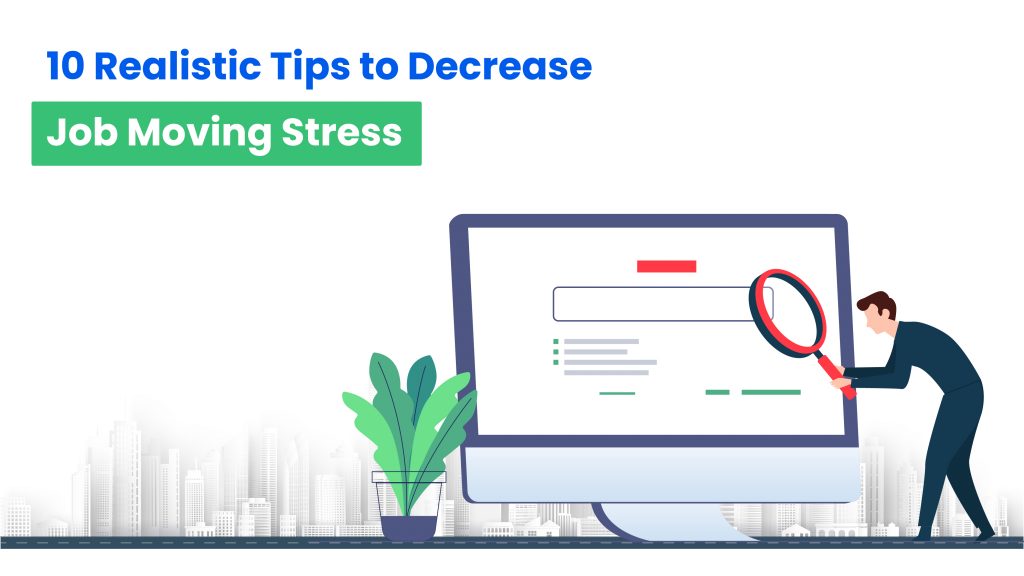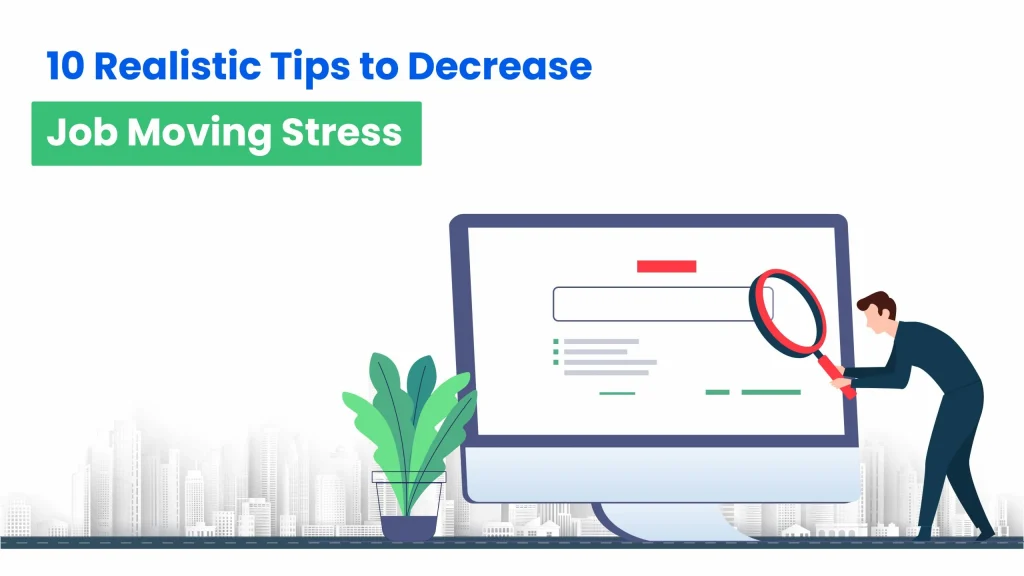If you’re relocating, you may consider the obvious responsibilities, like packing your belongings and booking a moving van. Moving anxiety, though, frequently extends far further than the to-do list.
Of course, your anxiousness may be partially a result of the reasons you moved in the first place. Moving may be stressful, whether it’s an optimistic or terrible scenario. You’re not only moving and upsetting your life; you’re also abandoning familiar surroundings and stepping into uncharted territory that may be a new area, city, or state.
Moving is, without a doubt, a significant transformative occurrence in your life which might trigger moving stress.

How to Deal With Job-Finding Stress?
Moving out is quite stressful and finding a job afterwards adds to the stress. Here are some tips that can help you cope with job-finding stress.
1. Look up jobs in the new place
Try to search for jobs in your new locality. Be flexible while considering your options. You can work part-time jobs until you find something stable. You can look for work-from-home and online jobs.
Trying out online and part-time jobs may help you in two ways: it will feed and keep you engaged until you find something permanent and enrich your work experience.
2. Put yourself out there
Fill out job applications, attend interviews, send resumes, register and apply on employment sites and offices. If you are looking for a job, then market yourself on the job market.
It does not matter whether you pass or fail the interviews but do attend them. With every positive attempt made, you can know your mistakes and try to improve next time.
3. Hone your skills
Honing your skills is equally important as job hunting. You may learn to try any new skill or try to polish a known one. Also, you may take up a job-relevant skill or try a general one. You can learn the skill of your choice, but the importance of skill remains unchanged. Besides, learning something new may keep your mind occupied with less scope for stress.
So try to be open to new skills, job openings and new challenges.
4. Stay positive
Finding a new job after moving is a challenging task. You may have to learn many things, apply for many jobs and spend considerable time and money. But the result might only sometimes be positive and favorable to you.
But you must learn to make the most out of situations and stay positive. Being positive might not land you a job, but it can help keep stress under control.
How to Deal With Job-Moving Stress??
1. Ask for relocation support
If you are moving out on an official job transfer, your company or employer may be entitled to provide some basic facilities (housing quarters, company transport or HRA). If not, there can be a Relocation Compensation Sum offered.
In any case, discuss with your employer the relocation benefits offered by the company or organization. Asking this would provide you with benefits or at least some financial contribution to aid your relocation.
2. Ask for relocation benefits
While moving your Job, ask your employer about transfer benefits. It means the advantages or changes in your work terms due to relocation.
It might include promotions, pay raises, or even changing work profiles. Being aware of this will keep away from moving stress. Besides, once you know the changes and advantages awaiting, you can prepare yourself accordingly.
3. Get acquainted with the new workplace
There might be pressure in trying to fit into a new workplace. To overcome this, get to know your workplace better. Get acquainted with your colleagues, work on new responsibilities and feel comfortable.
Remember, you don’t have to squeeze yourself, to fit in forcefully, but you could work on small changes that will help you know how to deal with moving stress.
4. Find a mentor
If you face work-related difficulties or encounter something you don’t know, you don’t have to stress out. You can always find a mentor to help you.
By mentor, it means something other than looking out for a full-time teacher. It would help if you found someone who can guide and groom you. It will help you with stress free moving. The mentor can be a colleague, supervisor, junior, or friend.
5. Be clear about your motives
Knowing what you want can help you work for it. When you are moving with a job transfer, know your motives. You may be moving for a promotion, better work conditions, or even a better place.
Knowing the reason will reduce unnecessary stress and let you work on it. This ‘motive’ can help you decipher how to work for it.
6. Increase your professional network
Being anxious about moving for a job is quite normal. But you can arm yourself by building your professional network. Get to know people from your field of work. Make business contacts and build healthy relationships.
One of the best ways to reduce stress on moving is to excel at your Plan for career and work towards it.
7. Look for alternatives
You don’t have to stress about unfavorable work conditions or non-negotiable terms. Remember, you can always look out for alternatives. You can find new jobs, learn a new skill or even work remotely.
Every Job comes with a reasonable amount of stress. But too much stress is unacceptable. In such a case, try to change your approach and options.
How to Ensure Stress-Free Moving?
1. Create a budget
Financial Management can be a significant source of stress. Hence tackle it first. Create a budget for moving. List down the pros and cons of job moving.
Compare your salary & savings to expenses and financial commitments. Know how much you can spend and on what. Make a budget and stick to it. Include an emergency fund in the budget.
2. Balance work and moving
Juggling work and moving can become quite stressful. Hence take leave to plan your move correctly. Pack your belongings, hire a good moving company and relocate to your new house. If your packing is organized, it will take little time to unload if you complete all the paperwork before moving. It will help you get back to work soon.
3. Be organized
Being organized means much more than packing and labeling boxes. It prepares for each step of the Job moving and relocation process including registrations, looking for the new house, paperwork, packing, hiring movers, relocation and finally rejoining the Job. Organization means knowing how, when and why of each task. It will prioritize the tasks and ensure stress-free moving.
Being organized will ensure stress-free moving.
4. Have some stress busters
Apart from work and moving, give some time to stress busters. Spend time with your family, talk to friends or indulge in your hobby. Get ample rest and care for your health; upset health and restlessness only add to your stress levels.
Find the source of your stress (which differs from everyone) and try to tackle it. Know what relieves your stress and work on it.
Take Away
Job moving and relocation doesn’t always need to be stressful. It depends on how to plan and execute these tasks. It depends on how to cope with the stress. Don’t worry; you are not alone in this. Take the help of family and friends. If you are moving out alone, hire some helpers. Either way, find a way to reduce stress and have a happy job moving and relocating.



